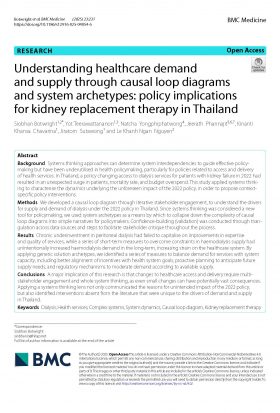This website uses cookies so that we can provide you with the best user experience possible. Cookie information is stored in your browser and performs functions such as recognising you when you return to our website and helping our team to understand which sections of the website you find most interesting and useful.
Understanding healthcare demand and supply through causal loop diagrams and system archetypes: policy implications for kidney replacement therapy in Thailand

Details
Abstract
Background
Systems thinking approaches can determine system interdependencies to guide effective policymaking but have been underutilised in health policymaking, particularly for policies related to access and delivery of health services. In Thailand, a policy changing access to dialysis services for patients with kidney failure in 2022 had resulted in an unexpected surge in patients, mortality rate, and budget overspend. This study applied systems thinking to characterise the dynamics underlying the unforeseen impact of the 2022 policy, in order to propose context-specific policy interventions.
Methods
We developed a causal loop diagram through iterative stakeholder engagement, to understand the drivers for supply and demand of dialysis under the 2022 policy in Thailand. Since systems thinking was considered a new tool for policymaking, we used system archetypes as a means by which to collapse down the complexity of causal loop diagrams into simple narratives for policymakers. Confidence-building (validation) was conducted through triangulation across data sources and steps to facilitate stakeholder critique throughout the process.
Results
Chronic underinvestment in peritoneal dialysis had failed to capitalise on improvements in expertise and quality of services, while a series of short-term measures to overcome constraints in haemodialysis supply had unintentionally increased haemodialysis demand in the long-term, increasing strain on the healthcare system. By applying generic solution archetypes, we identified a series of measures to balance demand for services with system capacity, including better alignment of incentives with health system goals, proactive planning to anticipate future supply needs, and regulatory mechanisms to moderate demand according to available supply.
Conclusions
A major implication of this research is that changes to healthcare access and delivery require multi-stakeholder engagement and whole system thinking, as even small changes can have potentially vast consequences. Applying a systems thinking lens not only communicated the reasons for unintended impact of the 2022 policy, but also identified interventions absent from the literature that were unique to the drivers of demand and supply in Thailand.
Original source: https://rdcu.be/ejh4w




